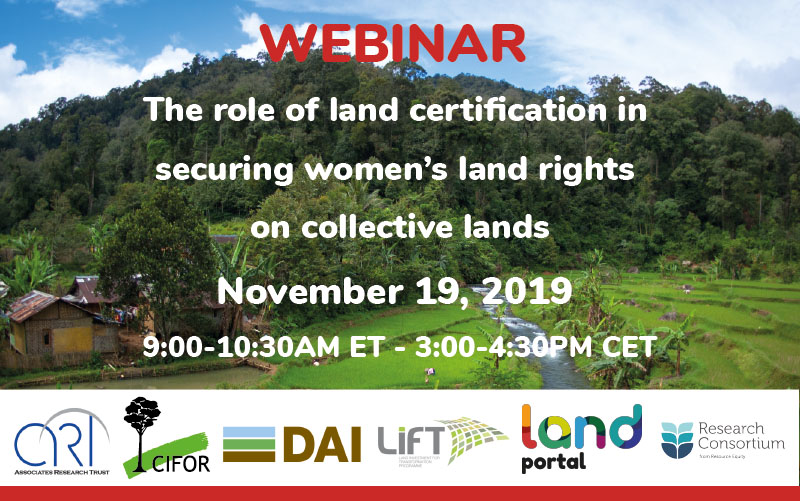How can formalization of collectively held land rights secure women’s rights?
Evidence shows that women can benefit from having individualised land rights formalized in their names. However, similar evidence is not available for formalization of land rights that are based on collective tenure. Studies have estimated that as much as 65 percent of the world’s land is held under customary, collective-tenure systems. Improving tenure security for land held collectively has been shown to improve resource management and to support self-determination of indigenous groups. Yet little attention has been paid to the question of whether women and men share equally in the benefits of formalizing collective tenure. This is complicated by the fact that very often, even if lands are held collectively, they are sometimes allocated and managed on an individual household basis.
Join the Webinar – Register Now (link is external)
November 19, 2019
9:00-10:30AM ET – 3:00-4:30PM CET
This webinar aims to explore the question: under what conditions might formalization of collective tenure improve women’s tenure security?
The Research Consortium, by Resource Equity, is a hub for collecting, sharing, and exchanging knowledge on how to effectively advance women’s land rights. The Consortium identifies gaps in knowledge and helps develop a common agenda for research so that learning can more easily be compared, shared, and applied.
In August of 2018 the Research Consortium launched a grant-making program. For the inaugural Request for Proposal the Consortium invited applicants to submit proposals on the topic of the effectiveness of land and resource tenure interventions to improve the lives of women. The grant-supported research covers interventions in Ethiopia, Uganda, and Indonesia/Peru/Uganda, each covering different intervention types: large-scale, systematic land certification to individual or jointly-held plots, issuing certificates of customary ownership on lands that are held collectively but are managed on an individual household basis, and formalization approaches on collective-held and communally managed rights to forest lands.
Panelists will address the following questions:
- What mechanisms can help ensure that women’s rights are protected equally with those of men in different processes for formalizing land rights?
- What lessons, challenges, or questions remain on how to ensure gender-equitable outcomes in different processes for formalizing land rights?
- What are the most important enabling conditions for achieving gender equity in outcomes?
- What kinds of data are helpful in answering these questions?
- What are the next steps for the research community?
Register now (link is external)
Moderator: Amanda Richardson, Resource Equity
Speakers:
- John Leckie, DAI- Global
- Iliana Monteresso, CIFOR
- Paul Ntegeka, Associates Research Trust- Uganda








